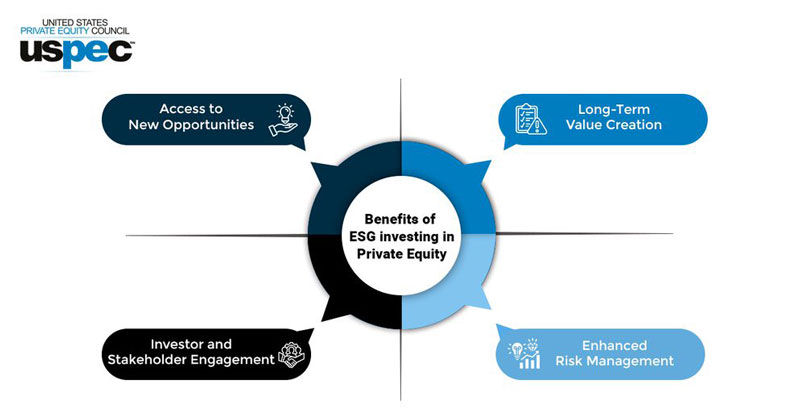Introduction
In the ever-evolving landscape of investment strategies, Environmental, Social, and Governance (ESG) investing has gained significant traction across various sectors. Private equity, known for its pursuit of high returns through investment in privately-held companies, has also been impacted by the rise of ESG considerations. ESG investing in private equity entails integrating environmental, social, and governance factors into investment decision-making, focusing not only on financial performance but also on sustainable and responsible practices.
This article delves into the concept of ESG investing, explores its distinctions from impact investing, highlights key considerations for private equity decision-making, uncovers the benefits, and addresses the challenges associated with integrating ESG principles in the private equity industry.
What is ESG investing?
ESG investing is an investment approach that incorporates Environmental, Social, and Governance factors into the investment decision-making process. It goes beyond solely focusing on financial returns and considers the broader impact of investments on the environment, society, and corporate governance practices. By assessing companies through an ESG lens, investors aim to align their portfolios with sustainable and responsible business practices, promoting positive change and long-term value creation.
ESG investing vs. Impact investing
While ESG investing and impact investing share a common goal of aligning investments with positive social and environmental outcomes, they differ in their approaches. ESG investing focuses on integrating ESG considerations into investment decision-making across various asset classes, including private equity. On the other hand, impact investing specifically targets investments that generate measurable social and environmental impact alongside financial returns.
Key ESG considerations for private equity decision making
When incorporating ESG considerations into private equity decision-making, several key factors warrant attention. These considerations help investors evaluate the sustainability and responsibility of potential investments. Some essential ESG considerations for private equity include:
Environmental Factors
- Assessing a company's carbon footprint and environmental impact: Private equity investors should evaluate a company's environmental practices and their impact on climate change. This includes analyzing greenhouse gas emissions, energy consumption, and the company's efforts to reduce its carbon footprint.
- Evaluating resource consumption and waste management practices: Understanding how a company manages its resources, such as water and raw materials, is crucial in assessing its sustainability. Private equity firms should consider companies that prioritize resource efficiency and implement effective waste management strategies.
- Identifying opportunities for sustainable practices and renewable energy adoption: Private equity investors can identify potential investments that embrace sustainable practices and renewable energy sources. This may involve assessing a company's commitment to renewable energy usage, such as solar or wind power, and its efforts to integrate sustainability into its operations.
Social Factors
- Evaluating labor practices, employee welfare, and diversity and inclusion policies: Private equity firms should consider a company's approach to fair labor practices, employee well-being, and diversity and inclusion. This includes examining policies related to fair wages, employee benefits, health and safety measures, and promoting a diverse and inclusive workforce.
- Assessing community relations and impact on local stakeholders: Understanding a company's relationship with local communities and its impact on stakeholders is essential. Private equity investors should consider how a company engages with the communities it operates in, supports local development, and manages potential social risks associated with its operations.
- Identifying potential risks related to human rights and supply chain management: Private equity firms should assess the risks associated with a company's supply chain, including potential violations of human rights, unethical labor practices, or issues related to child labor. Evaluating a company's commitment to responsible sourcing and supply chain transparency is crucial.
Governance Factors
- Evaluating the quality and independence of board structures: Investors should assess the composition and independence of a company's board of directors. A robust governance structure with independent directors can contribute to effective oversight, risk management, and decision-making.
- Assessing executive compensation and alignment with long-term value creation: Investors should consider whether a company's executive compensation packages align with long-term value creation and sustainable growth. Ensuring that executive incentives are tied to ESG goals and performance can encourage responsible decision-making.
- Identifying risks related to corruption, bribery, and ethical conduct: Investors should evaluate a company's commitment to ethical conduct and integrity. This includes assessing the company's anti-corruption measures, compliance programs, and adherence to ethical business practices.
By considering these key ESG considerations, private equity firms can make informed investment decisions that take into account the sustainability, responsibility, and long-term value potential of their portfolio companies.
The benefits of ESG investing in private equity
Integrating ESG principles into private equity investments offers several compelling benefits:
Enhanced Risk Management
- By considering ESG factors, investors can identify potential risks and mitigate them, reducing the likelihood of negative surprises and reputational damage.
- Companies with strong ESG practices tend to exhibit better risk management and are more resilient to environmental and social challenges.
Long-Term Value Creation
- Companies that prioritize ESG factors are more likely to drive sustainable growth and create long-term value for shareholders.
- Sustainable and responsible business practices often lead to increased operational efficiency, improved brand reputation, and enhanced customer loyalty.
Access to New Opportunities
- Integrating ESG considerations widens the investment universe, allowing access to innovative and forward-thinking companies that align with sustainable trends.
- Growing consumer demand for sustainable products and services presents attractive investment opportunities for private equity firms.
Investor and Stakeholder Engagement
- ESG-focused private equity investments align with the evolving expectations of investors, regulators, and other stakeholders, fostering trust and credibility.
- By actively engaging with portfolio companies on ESG matters, private equity investors can influence positive change and drive sustainable practices.

Challenges in ESG investing
While the benefits of ESG investing in private equity are evident, several challenges need to be addressed to ensure successful integration:
Data Availability and Quality
Obtaining reliable and standardized ESG data is a significant challenge in the private equity industry. ESG information is often scattered, inconsistent, and lacks a standardized reporting framework. This poses difficulties in accurately assessing and comparing companies' ESG practices and performance. Without reliable data, private equity firms may struggle to make informed investment decisions based on ESG criteria.
To address this challenge, collaboration among investors, regulators, and companies is crucial. Establishing industry-wide standards for ESG data collection, reporting, and disclosure can improve the availability and quality of data. Encouraging companies to adopt transparent reporting practices and disclosure requirements would enable private equity firms to obtain the necessary information for robust ESG analysis.
Limited Disclosure
Companies vary in their level of ESG disclosure, with some providing comprehensive information and others offering limited or vague details. Incomplete disclosure makes it challenging for private equity investors to gain a holistic understanding of a company's ESG practices. Without adequate information, it becomes difficult to accurately assess a company's environmental impact, social practices, and governance structures.
Private equity firms can address this challenge by actively engaging with portfolio companies to encourage enhanced transparency and disclosure practices. By promoting the importance of comprehensive ESG reporting and highlighting the benefits of transparent disclosure, investors can create incentives for companies to provide more detailed ESG information. Collaboration with industry associations and initiatives that promote ESG disclosure can also drive positive change in this area.
Complex Due Diligence
Integrating ESG considerations into the due diligence process requires specialized expertise and resources. Private equity firms may face challenges in conducting thorough ESG due diligence, as it involves evaluating various aspects such as environmental risks, labor practices, supply chain management, and governance structures. The complexity of ESG due diligence can be daunting, particularly for firms without dedicated ESG teams or expertise.
To overcome this challenge, private equity firms can collaborate with ESG experts, consultants, or specialized service providers. These professionals can assist in conducting comprehensive ESG assessments, identifying potential risks and opportunities, and integrating ESG considerations into investment decision-making. Leveraging external resources and expertise can help bridge the knowledge gap and ensure a more robust ESG due diligence process.
Balancing Financial Returns and Impact
One of the key challenges in ESG investing for private equity firms is striking the right balance between financial returns and measurable impact. Integrating ESG considerations may require trade-offs, as certain sustainable practices or investments in impact-focused initiatives may initially impact financial performance. Private equity investors need to carefully navigate these trade-offs to ensure that both financial returns and ESG objectives are adequately addressed.
To overcome this challenge, private equity firms can adopt a long-term perspective and consider the potential benefits of sustainable practices and responsible investments. While there may be short-term costs associated with implementing ESG initiatives, they can lead to long-term value creation, improved operational efficiency, and enhanced brand reputation. It is crucial for investors to analyze the potential positive impacts of ESG integration alongside financial considerations to make informed investment decisions that align with their overall objectives.
By addressing these challenges, private equity firms can unlock the full potential of ESG investing, benefiting both their portfolios and the broader sustainability agenda. The integration of reliable data, enhanced disclosure practices, specialized expertise, and careful balancing of financial returns and impact can pave the way for successful ESG integration in the private equity industry.
FAQs
-
Q- What is the difference between ESG investing and impact investing?
A- ESG investing integrates environmental, social, and governance factors into investment decision-making, whereas impact investing specifically targets investments that generate measurable social and environmental impact alongside financial returns.
-
Q- How can private equity firms benefit from ESG investing?
A- Private equity firms can benefit from ESG investing through enhanced risk management, long-term value creation, access to new opportunities, and improved investor and stakeholder engagement.
-
Q- What challenges do private equity firms face in ESG investing?
A- Private equity firms face challenges such as limited data availability and quality, limited disclosure, complex due diligence, and balancing financial returns with impact.
-
Q- How can private equity firms overcome challenges in ESG investing?
A- Private equity firms can overcome challenges in ESG investing by collaborating with ESG experts, encouraging enhanced disclosure, developing standardized metrics, and leveraging external resources for due diligence.
-
Q- Why is ESG investing important in the private equity industry?
A- ESG investing is important in the private equity industry as it aligns investments with sustainable and responsible practices, addresses societal and environmental challenges, and meets evolving investor and stakeholder expectations.
Conclusion
ESG investing in private equity has emerged as a dynamic force, bringing sustainable and responsible practices to the forefront of investment decision-making. By integrating ESG considerations, private equity investors can enhance risk management, create long-term value, access new opportunities, and engage with stakeholders effectively. However, challenges related to data availability, limited disclosure, complex due diligence, and balancing financial returns with impact must be navigated to maximize the potential of ESG investing. As the private equity industry continues to evolve, embracing ESG principles becomes increasingly crucial, fostering a more sustainable and inclusive future for businesses and communities alike.







